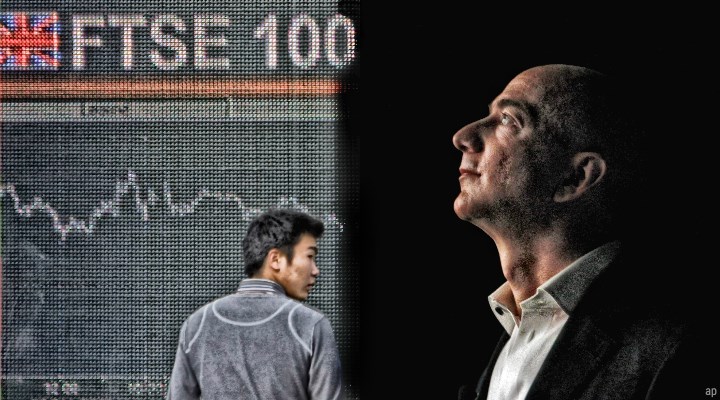.jpg)
We’re Boozing and Smoking More
It’s a stressful time for households. Perhaps it’s no wonder, then, that sales of alcohol and cigarettes fuelled a shock rise in consumer retail sales in April. Amid a cost of living crisis and spiralling, sales volumes jumped 1.4% last month, following a fall of 1.2% in March. Given the Bank of England’s insistence that interest rate rises will reroute cash in the real economy away from the high streets and into savings accounts, one does wonder whether the UK’s central bank makes of this very behavioural insight. It turns out humans don’t always do what institutions want them to do.
HSBC Just Had an ESG PR Disaster
It looks like all is not well at HSBC, after a seriously honest ESG expert ended up being rebuked by his employer for his views on ESG. Investment Week reports that Stuart Kirk, HSBC Asset Management’s global head of responsible investing, told a Financial Times event that floods and fires were an ignorable warning sign. "Who cares if Miami is six metres under water in 100 years? Amsterdam has been six metres underwater for ages and that is a really nice place. We will cope with it," he reportedly said. HSBC swiftly distanced itself from the presentation, which was entitled Why Investors Need Not Worry About Climate Risk, saying Kirk’s remarks "do not reflect the views of HSBC Asset Management nor HSBC Group in any way." It continued: "HSBC Asset Management is committed to driving the transition to a sustainable global economy and has a fiduciary responsibility to ensure its clients' monies are managed for positive long-term environmental and social outcomes."
... And So Did Rishi Sunak
At precisely the moment it would be extremely helpful for Rishi Sunak not to appear out of touch with the electorate’s financial woes, the chancellor appears in the Sunday Times’ rich list for the first time. The list, which is an annual compilation of the UK’s 250 richest people, places Sunak and wife Akshata Murty in 222th place with a joint fortune of £730 million. Entrants at the top of the list include vacuum king Sir James Dyson, magnate Sir Len Blavatnik, and business tycoons Sri and Gopi Hinduja. It is not yet clear how the chancellor intends to act on the cost of living, but it’s safe to say the story will be rich pickings for his opponents, both within the Conservative party and the wider world.
The BoE Blame Game Has Begun
This week we examined the extent to which economic forecasters and central banks can actually influence the economy. But one man isn’t being quite as open-minded. Former Bank of England governor Mervyn King launched an astonishing broadside at his former employer this week, saying it was partly responsible for the dramatic rise in the cost of living across the UK. "When you get an intellectual mistake in policy, and you allow inflation to rise, if you're then hit by bad luck – which is what happened in the 1970s and is happening now – it becomes a very unpleasant outcome," he said. "It takes tough action. And it's not a pleasant period through which we're going to have to go."
Nick Train is Fed Up With The Woodford Wait
Nearly three years after the suspension of Neil Woodford’s UK equity income fund, one of the UK’s other star managers is voicing his frustration at the fallout. Lindsell Train global equity fund and Finsbury Growth and Income trust manager Nick Train, who is an investor in Hargreaves Lansdown, said that a resolution to the saga was needed. “It is three years almost to the month since the suspension of the Woodford fund and we have not been offered any report on the circumstances,” Train told an event. "People who participated in that, to a greater or lesser extent, need to be sued or exonerated. I can see why people are waiting for that." He also took Hargreaves to task over its business strategy. “We are forever badgering Hargreaves to stop paying so much in special dividends and invest more in functionality and opportunities that present themselves to the biggest investment platform in the UK,” he said. "There is evidently major opportunities to expand the business … but they need to spend to do it," Train said.
Elon Musk Has Sent *The* Tweet
No sooner than he had pumped the brakes on his deal to buy Twitter, Elon Musk was taking aim at the S&P500 over its removal of Tesla from its ESG index. "Exxon is rated top ten best in world for environment, social & governance (ESG) by S&P 500, while Tesla didn’t make the list! ESG is a scam. It has been weaponised by phony social justice warriors,” the South African billionaire tweeted. One wonders what HSBC Asset Management’s Stuart Kirk thinks about that.
Innovation is Mispriced
This week we’ve devoted the lion’s share of our coverage to the topic of investing in the UK. As a sub-topic, we also wanted to ask how investors can identity "true" innovation, and it just so happens one fund manager has his eyes on precisely that question. Senior editor James Gard spoke to Mikhail Zverev, one of the managers of the TB Amati Strategic Innovation Fund, about what the "i" word really means, and how investors can be wrong-footed by how innovation occurs, and who enables it.
SoftBank Has Changed its Tune
Catastrophic full-year results at the world’s largest technology sector investor are a window for UK investors into the global selloff and how big players are responding. That’s the contention of an article by Morningstar Australia data journalist Lewis Jackson this week, which lays bare the transformation in rhetoric at SoftBank. Not everything has changed though. According to CEO and chairman Masayoshi Son, the information revolution means "happiness for everyone." It’s possibly the most anaesthetic sentence we’ve seen all week.
We Could Be Heading for House Price Hell
OK, that’s a bit dramatic, but the latest take on the UK’s housing market from the outgoing chief executive of Nationwide makes for interesting reading. Joe Garner thinks the impact of inflation could have a serious impact on consumer spending power, virtually reversing the trend witnessed at the height of the pandemic, where stamp duty suspensions fuelled rising demand for an all-too-short supply of housing stock. It’s going to be a rough old ride.
UK Funds Are Being Picked Last
Every month we look at the inflows and outflows of UK-domiciled funds, and this week’s UK focus posed the perfect opportunity to do just that once more. Data journalist Sunniva Kolostyak has looked at the flow data for the last decade, and funds with a UK focus – across fixed income and equities – are consistently less popular. Manager research analyst Bhavik Parekh explains more: "Firstly, some of the typically strongest dividend payers have tended to be those who have had relatively poor capital appreciation," he says. "Secondly, many UK equity income funds have matured, meaning investors are withdrawing their assets for retirement or to invest in newer areas of the market such as in sustainable vehicles."




























